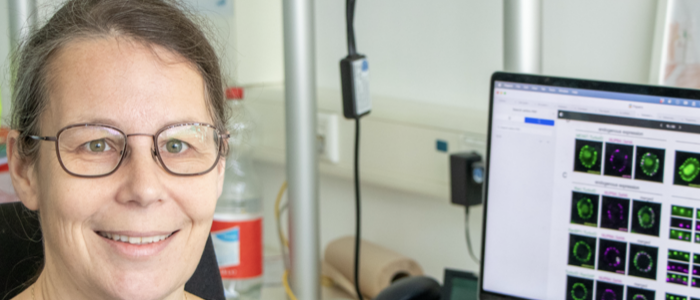Susanne Kramer


Susanne Kramer
... is a molecular biologist with a particular interest in spatial aspects of mRNA metabolism and posttranscriptional regulation of gene expression. Susanne received her degree in biochemistry at the Free University in Berlin in 2000, where she also started her PhD project in the laboratory of Professor Michael Boshart. She received her doctoral degree in 2005 at the LMU in Munich, followed by six years of postdoctoral studies at the Department of Biochemistry in Cambridge (UK) in the lab of Professor Mark Carrington. Susanne joined the Biocenter as a Junior Group leader in November 2011 (Kramer lab) with a DFG-own-position. In 2018 she recieved Heisenberg funding, which was recently transformed into a Heisenberg Professorship.
2022 Heisenberg Professorship (RNA Biology of Kinetoplastids), Cell and Developmental Biology, University of Würzburg
2018 Group leader, Heisenberg funding (DFG), Cell and Developmental Biology, University of Würzburg
2016 Habilitation, University of Würzburg
2011 Junior group leader, Cell and Developmental Biology, University of Würzburg
2005-2011 Postdoc, Cambridge (UK)
2005 Postdoc, LMU Munich
2005 Dr. rer. nat, LMU Munich
susanne.kramer(at)uni-wuerzburg.de
Tel ++49 93131 86785
Research synopsis
Susanne has used the African trypanosome as a model system since 2001 and worked on two different aspects: During her PhD time she has characterized the trypanosome homologue to a protein kinase A that has highly unusual features in trypanosomes. During her Postdoc time in Cambridge, Susanne became interested in understanding post-transcriptional control mechanisms of gene expression: trypanosomes have almost no transcriptional control and are perfect model organisms for this research area. In particular, Susanne became very interested in RNA-granules, small membrane-less organelles that are separated from the cytoplasm by liquid liquid phase separation, with still largely unknown function. In Cambridge, Susanne has characterised the RNA granule repertoire of trypanosomes as well as several key granule proteins. With her own group at the Biocenter in Würzburg, Susanne has developed methods for RNA granule purification. Two unexpected outcomes from the purification of trypanosome RNA granules were 1) the discovery of the highly unusual trypanosome mRNA deapping enzyme, which belongs to the novel enzyme class of ApaH like phosphatases and 2) the discovery that mRNA export can occur co-transcriptionally in trypanosomes. Both findings are subject to on-going research.
More details about Susanne Kramer's research can be found here.
Key Publications
Gabiatti,B.P., Krenzer,J., Braune,S., Krüger,T., Zoltner,M. and Kramer,S. (2025) Detailed characterisation of the trypanosome nuclear pore architecture reveals conserved asymmetrical functional hubs that drive mRNA export. PLOS Biol., 23, PMID: 39899609
Odenwald,J., Gabiatti,B., Braune,S., Shen,S., Zoltner,M. and Kramer,S. (2024) Detection of TurboID fusion proteins by fluorescent streptavidin outcompetes antibody signals and visualises targets not accessible to antibodies. eLife, 13, RP95028. PMID: 39206942
Kramer,S., Karolak,N.K., Odenwald,J., Gabiatti,B., Castañeda Londoño,P.A., Zavřelová,A., Freire,E.R., Almeida,K.S., Braune,S., Moreira,C., et al. (2023) A unique mRNA decapping complex in trypanosomes. Nucleic Acids Res., 10.1093/nar/gkad497. PMID: 37309887
Kramer, S., Meyer-Natus, E., Stigloher, C., Thoma, H., Schnaufer, A. and Engstler M. (2020) Parallel monitoring of RNA abundance, localisation and compactness with correlative single molecule FISH on LR White embedded samples. Nucleic Acids Res 49, gkaa1142- PMID: 33275141
Bachmaier, S, Santos YV, Kramer S, Githure GB, Klöckner T, Pepperl J, Baums C, Schenk R, Schwede F, Genieser HG,
Dupuy JW, Forné I, Imhof A, Basquin J, Lorentzen E & Boshart M. (2019) Nucleoside analogue activators of cyclic AMP-independent protein kinase A of Trypanosoma. Nat Commun 10, 1421. PMID:30926779
Goos C, Dejung M, Wehman AM, Meyer-Natus E, Schmidt J, SunterJ , Engstler M, Butter F and Kramer S. (2019) Trypanosomes can initiate nuclear export co-transcriptionally. Nucleic Acid research 47, 266-282. PMID:30418648
Kramer S (2017) The ApaH-like phosphatase TbALPH1 is the major mRNA decapping enzyme of trypanosomes. PLoS Pathog 13: e1006456 PMID:28628654
Kramer S (2017) Simultaneous detection of mRNA transcription and decay intermediates by dual colour single mRNA FISH on subcellular resolution. Nucleic Acids Res 45: e49 PMID:27940558
Fritz M, Vanselow J, Sauer N, Lamer S, Goos C, Siegel TN, Subota I, Schlosser A, Carrington M and Kramer S. (2015) Novel insights into RNP granules by employing the trypanosome’s microtubule skeleton as a molecular sieve. Nucleic Acids Res 43:8013–8032. PMID:26187993
Krüger T, Hofweber M, Kramer S. (2013). SCD6 induces ribonucleoprotein granule formation in trypanosomes in a translation-independent manner, regulated by its Lsm and RGG domains. Mol Biol Cell 24: 2098-2111. PMID:23676662
Kramer S, Marnef A, Standart N, Carrington M. (2012). Inhibition of mRNA maturation in trypanosomes causes the formation of novel foci at the nuclear periphery containing cytoplasmic regulators of mRNA fate. J Cell Sci 125: 2896-2909. PMID:22366449
Kramer S, Queiroz R, Ellis L, Hoheisel JD, Clayton C, Carrington M. (2010). The RNA helicase DHH1 is central to the correct expression of many developmentally regulated mRNAs in trypanosomes. J Cell Sci 123: 699-711. PMID:20124414
Kramer S, Queiroz R, Ellis L, Webb H, Hoheisel JD, Clayton C, Carrington M. (2008). Heat shock causes a decrease in polysomes and the appearance of stress granules in trypanosomes independently of eIF2(alpha) phosphorylation at Thr169. J Cell Sci 121: 3002-3014. PMID:18713834








